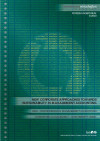Suchergebnisse
SUMMIT, Sustainable Management Methods Integrating Tool-Kit and Prepare Plus
A individual company and process evaluation defines the tools-mix of sustainable orientated management methods implemented in the companies. The well know in Instrument Prepare will be further developed adding the innovation strategy TRIZ "systematic inventing", making the new Prepare plus instrument.
Using the Sustainability Balanced Scorecard (SBSC) at operational and inter-operational level (ÖKOPROFIT) for reconciliating the systems of objectives in the realm of sustainability
Further development and implementation of the sustainability scorecard for definition of sustainable objectives on cross-company level (local agenda 21 project ÖKOPROFIT) and company level. Comparing the target systems.
Development of a comprehensive procedure within the design of high-speed-cutting processes in consideration of environmental protection and occupational health aspects
In the metal working industry high-speed-cutting (HSC) in connection with minimal quantity cooling-lubrication promises a high potential for saving process materials. On the one hand costs of purchase and disposal of metal working fluids (MWF) decrease, on the other hand the reduction of dermal diseases and emissions of MWF-dusts are expected.
Sustainability Management System - scorecard-based construction of an operative sustainability management
Implementation of a scorecard-based sustainability management system in four enterprises; adaptation of a web-based software for sustainability management and reporting; preparation of the manual "Sustainability Managing Systems" on the basis of the OIN guidelines "Reporting about Sustainability".
SUPROMED: Reprocessing and Reuse of Single Use Medical Devices in the Light of Sustainable Development Criteria - Implementation in Austria
In contrast to other countries there is currently no reprocessing and reuse of single use medical devices in Austria. Thus the potential for major ecological and economical savings remains unused. In a stakeholder dialogue, practical implementation strategies were developed to change the trend towards a sustainable value-added chain.
Developtement of a procedure to increase the sustainability along the supply chain through integration of customer and supplier knowledge
Development of a procedure for the design of innovative and sustainable products, processes and services by making use of customer and supplier knowledge. Orientation of the developed sustainability strategy towards the supply chain of producing SMEs.
Feasibility concept for a customer-focused and resource-efficient production of wood-products, considering a parquet factory as an example
An innovative approach aiming higher resource-efficiency and added value by using new quality standards and production systems in parquet industry. A customer friendly product will be possible by combining industrial production methods with the flexibilty of a manufacture.
Development of a holistic valuation of enterprise-activities for sustainability and field test in leading industrial companies - InaBe
The development of a holistic model comprising method and instrument to evaluate ac-tivities from companies in context with sustainable development by integrating objective and subjective view.
Intelligent and green? User centred scenarios for information technology use in sustainable buildings

The project asked for the contribution of information technology use to the environmental performance of buildings - in terms of the vision of designers, practical use in existing projects and expectations of potential users.
ZERMEG III - Decision guidance for the visualisation of the achievements of sustainable corporate strategies
ZERMEG III creates a virtual factory of the future from the combination of the research results of different projects. This model will be used to generate real experience for managers in experimenting taking organisational and technical decisions with regard to a sustainable development.
Development of methods and procedures to automate the operative production control and scheduling considering the aspects of sustainability
The production order doesn't only influence logistic and operational ratios, but also shows effects on the environment as well as ergonomics and the staff's psychology. Aim of the project was to develop a method to optimize the job order planning in consideration of an integrated evaluation in terms of sustainable economic activity.
New Corporate Approaches Towards Sustainability In Management Accounting

EMA - Environmental Management Accounting Integrated Management - Cost-/Benefit Check
Forschungsforum
3/2003
Herausgeber: BMVIT
Englisch, 6 Seiten
Downloads zur Publikation
Development of a Performance- and Risk-Management-Concept for Sustainable Supply Chain Networks
The target of this project is to develop a specific performance and risk-management concept for companies in sustainable supply chain networks. By using this concept the involved companies will be able to reduce various risks and have more success with sustainable development.
